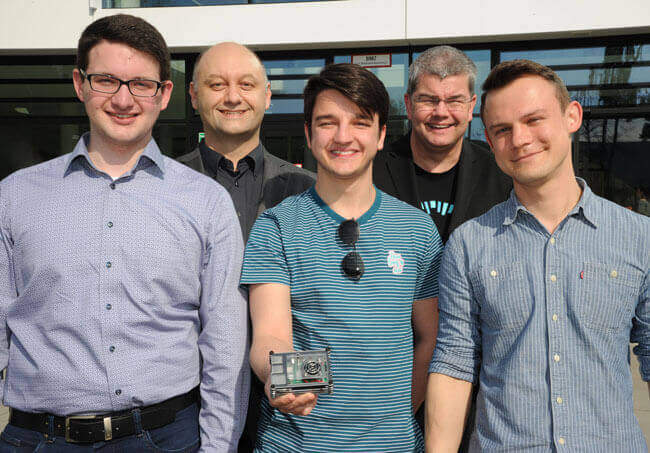Start a company as part of your studies – the study program “Entrepreneurial Cybersecurity”

The course initiators Prof. Bernd Finkbeiner (back left) and Prof. Andreas Zeller (back right) with the inventors of the "Bitahoy Watchdog“: Alexander Fink, Marius Bleif and Roman Tabachnikov (front from left to right)) © Becker und Bredel
Studying IT security and founding a company at the same time – this is what the master’s course “Entrepreneurial Cybersecurity” at Saarland University offers. In just four semesters, students develop an idea for starting a business in IT security and bring the first prototypes to market maturity. For the best ideas, start-up scholarships and appointments with investors are arranged. One example is the project “Watchdog for home networks” from the first graduating class.
The still quite young master’s course at Saarland University gives students the opportunity to develop and realize their own start-up ideas during their studies. This mixture of studying and entrepreneurship is unique in the world. Right from the start, students work in groups on a business idea on a topic related to IT security. Together with mentors from science and business, they refine this idea and then present their project to a jury of researchers and sponsors, who decide on its progress – and on possible investments. “What’s particularly motivating about our degree program is that you don’t just pursue some random projects, but work on something of your own that you can use to finance your living expenses after graduation,” says Marius Bleif. Together with his team colleagues Roman Tabachnikov and Alexander Fink, he will be one of the first graduates of the course, which was launched in the winter semester of 2018.
The three students from Saarbrücken are developing a product that is designed to safeguard networked devices in the home network. Numerous such devices are used in “smart homes,” whether as light switches, personal scales, cameras or thermostats. Security flaws that allow an attacker to spy on the home or even manipulate devices are a widespread problem here. This is why the students have developed a “watchdog” for home networks, the “Bitahoy Watchdog”. The approximately cigarette-box-sized computer is integrated into the home network. There it monitors the network and the communication of all devices in it. If a device behaves unusually, the watchdog alerts the owner. The software running on the minicomputer uses machine learning and artificial intelligence algorithms. “Every form of communication over the Internet has its own characteristic patterns. We can recognize and immediately evaluate these with our program,” explains Roman Tabachnikov.
For example, when a video is streamed, the traffic looks different from a search query with a search engine. If you combine this knowledge about the so-called metadata with the knowledge about which device is currently communicating, conclusions can be drawn as to whether the device is doing what it should be doing, or whether it is behaving suspiciously. In practice, the watchdog’s artificial intelligence is trained with the metadata of widely used home network devices. The watchdog thus learns the “normal behavior” of a device from a large pool of data and compares it during use with its actual behavior in the home network. If the communication patterns differ remarkably from one another, the watchdog raises the alarm. With their product, the students have already been able to arouse the interest of investors; now they want to found a company for further development and marketing.
“The aim of the master’s degree program is to coax such innovative projects out of the students,” says Professor Andreas Zeller. Together with his colleague Bernd Finkbeiner, he initiated the “Entrepreneurial Cybersecurity” course. Both are professors of computer science at Saarland University and do research at the Helmholtz Centre for Information Security (CISPA) in Saarbrücken. “We are sure that many computer science students have outstanding company and product ideas that are worth putting into practice. But often young people simply lack the necessary experience and expertise to successfully start up a company,” continues Zeller. This is what the new course of studies wants to change: Around half of the course consists of lectures and seminars on cybersecurity and computer science. The other half of the course comprises the start-up project and the master’s thesis based on it – and this is where the students build prototypes, investigate the market, and develop business plans so that they are completely “ready to start up” at the end of the course.
Saarland University and its associated non-university research institutes offer the right conditions for this. There are experts in every field of IT security who can, for instance, clarify the scientific validity of an idea or give students thought-provoking impulses. The team of the IT security incubator on campus answers all questions and deals with all problems related to the founding of a company. If you ask the team of entrepreneurs where the journey will take them, they are sanguine: “The watchdog is only the beginning. In the long run, we want Bitahoy to become a security service provider for home network devices.”
The state government of Saarland recently awarded the master’s degree course “Entrepreneurial Cybersecurity” with the Saarland State Prize for University Teaching.
More Information:
https://www.uni-saarland.de/en/study/programmes/master/ecs.html
The application deadline for the upcoming winter semester is July 15th.
Questions can be directed at:
Prof. Dr. Andreas Zeller
+49 (0)681 / 302-70971
zeller@cispa.saarland
Editor:
Philipp Zapf-Schramm
Competence Center Computer Science
Saarland Informatics Campus
Phone: +49 681 302-70741
E-Mail: pzapf@mmci.uni-saarland.de
Die Öffentlichkeitsarbeit am Saarland Informatics Campus wird unterstützt durch das Kompetenzzentrum Informatik Saarland, gefördert aus Mitteln des Europäischen Fonds für regionale Entwicklung (EFRE) und Mitteln der Staatskanzlei Saarland.


